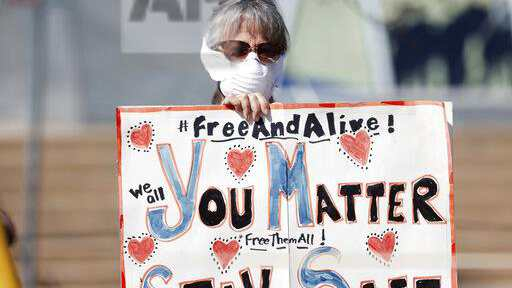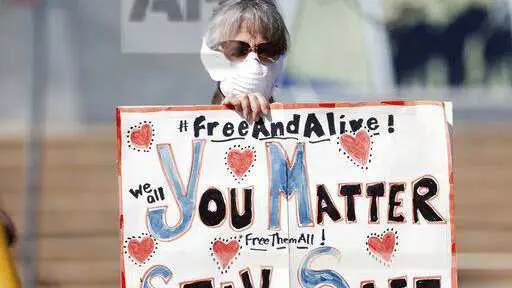
**Editor's note: **Andrew Korybko is a Moscow-based American political analyst. The article reflects the author's opinion, and not necessarily the views of CGTN.
Trump's surprise tweet on Monday night that he plans to sign an Executive Order temporarily suspending immigration to the United States contradicts the most famous passage associated with The New Colossus poem on the Statue of Liberty: "Give me your tired, your poor, Your huddled masses yearning to breathe free." Those words epitomized the founding message of the American democracy for nearly two and a half centuries, yet they've just been rendered null and void by the sitting President of the United States.
The U.S., like any sovereign nation, has the right to decide who it allows into its borders, but the symbolism of Trump's tweet shattered everything that America used to stand for. A significant share of the U.S.' soft power rests in the so-called "American Dream" that anyone anywhere in the world can move to the country at any time, start a new life, and "make it" (understood in the traditional American context to at the very least mean that they can improve their living standards compared to whatever they were living prior to immigrating there).
This was especially the case with those who either self-identify with being "tired," "poor," and/or "yearning to breathe free" or are considered as such by the U.S. government such as those designated to be refugees (both in the conventional sense and the political one). Truth be told, Trump hasn't ever hid his disdain for his country's generally liberal immigration policy, whether pertaining to legal or illegal immigrants, so it wasn't all that surprising in hindsight that he'd use COVID-19 as the pretext for pushing through his agenda.

Thy Chea, of Lowell, Mass., center right, originally of Cambodia, hugs his daughter on his arrival at Boston's Logan Airport, February 26, 2020, after getting his green card reinstated last year. /AP
There's no longer any disputing the fact that foreigners of any kind – be they casual travelers, international students, businessmen, or immigrants – could in theory (key qualifier) be carriers of COVID-19 or any other infectious diseases, so he has a point when he began his tweet by declaring that his move was being carried out "in light of the attack from the invisible enemy." That said, he also has clear economic motives too, which he proudly revealed by writing that this is also "to protect the jobs of our great American citizens."
Trump and his supporters believe that low-skilled immigrants take American jobs and drive down wages for the rest of the population, and they're also convinced that a conspicuous number of them either isn't able to assimilate into American society or even sometimes outright refuse to. These notions have driven the President to attempt the most radical reform of his country's immigration policy in history in order to increase the percentage of highly skilled immigrants who sincerely intend to assimilate into society.
The legitimate concerns related to containing the COVID-19 outbreak have created the perfect opportunity for Trump to take matters into his own hands through the Executive Order, that he tweeted about, without having to go through Congress like he'd otherwise be expected to. There's practically nothing that elected officials can do to stop him at this point since they'd be portrayed as standing in the way of public health for political reasons even though he himself arguably has his own political reasons for doing this.
Trump failed to build his fabled border wall for a variety of reasons, but he's politically astute to know that he can compensate for this unfulfilled campaign promise by temporarily suspending all immigration to the U.S. for the time being, thus improving the odds that the wavering members of his base remain loyal to him in November. It's entirely foreseeable that he won't order the resumption of this process until he can ensure that highly skilled and assimilation-intended aspirants are prioritized over "tired," "poor," and "unfree" ones.
The very fact that he's doing this precisely at the time when he announced his plans to "Open Up America Again" instead of when he first recommended its shutdown shows that he's taking political advantage of the situation to shape what the "reopened America" looks like for future generations. Should he succeed, then his nationalist policy of "America First" might lead to more socio-economically "productive" immigrants coming to his country, but it might also deal a heavy soft power blow to its reputation in the eyes of the majority of aspirations who might no longer qualify but previously believed with all their heart in the "American Dream."
(If you want to contribute and have specific expertise, please contact us at
.)
 简体中文
简体中文

